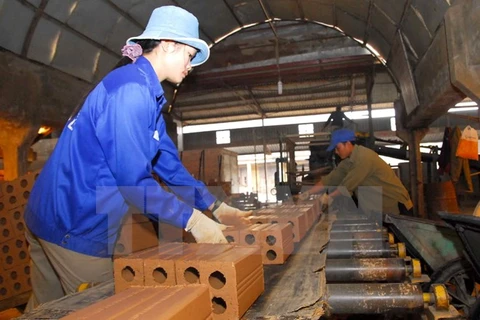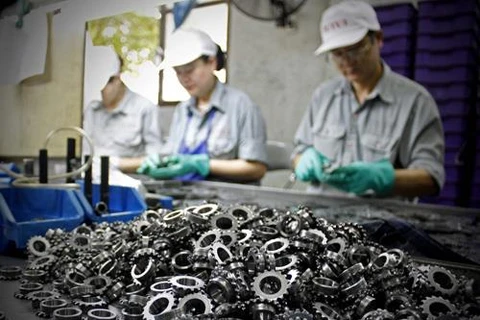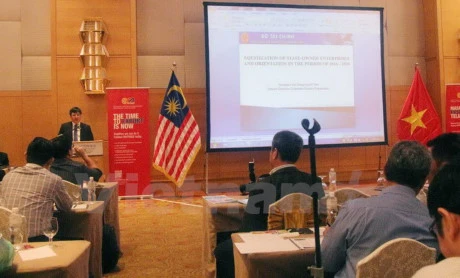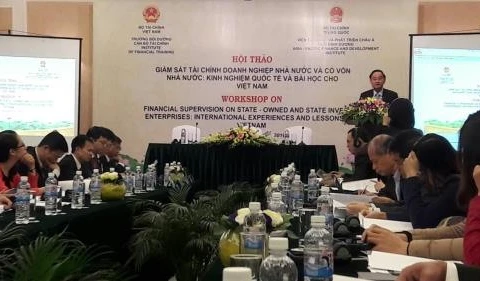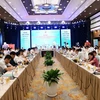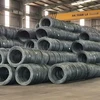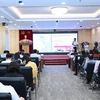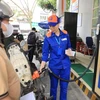Hanoi (VNA) - To create a fair business environment to promote the development of the private sector, experts said restructuring of State-owned enterprises (SOEs) must be hastened.
Vu Tien Loc, Chairman of the Vietnam Chamber of Commerce and Industry (VCCI) said that restructuring SOEs would create opportunities for the private sector, considered the driver for growth in the next phase of restructuring.
Loc said at an economic forum held recently in Hanoi that the work of equitising SOEs had been disappointing, despite being one of three major pillars of economic restructuring in 2011-15.
“Significant resources are still in the hands of SOEs. Equitisation must now focus on quality rather than quantity,” Loc said. “This is important as equitisation and State divestments will create opportunities for private investors to buy stakes and become strategic stakeholders.”
According to Deputy Chairman of the National Assembly’s Economic Committee Nguyen Duc Kien, the Government encouraged the private sector to participate in the restructuring of SOEs without a cap on stake holdings for private investors, except in credit institutions.
The biggest challenge is implementing economic restructuring efficiently, given unpredictable global developments, such as Brexit, Kien said.
Dau Anh Tuan, Head of the VCCI’s Legal Department, said the picture of the private sector in Vietnam remained worrisome, citing that more than 58 percent of private firms were unprofitable.
Private firms were still struggling to access resources, especially loans and land, Tuan said.
“A business environment in which firms of all sizes and from all economic sectors can access resources is critical,” Tuan said.
Dang Quyet Tien, Deputy Director of the Corporate Finance Department under the Ministry of Finance said that the equitisation was slow compared to economic development.
“The stagnation is due to the failure to renovate corporate governance and a lack of accountability,” Tiến said. “Equitisation is not simply selling stakes but a process in which SOEs will be renovated towards efficiency,” he said.
Director of the ministry’s Enterprise Development Department Ho Sy Hung questioned why stakes in many SOEs remained unattractive to buyers, citing that nearly half of 426 SOEs which implemented stake sales from 2011 to September 2016 failed to sell their stakes.
Duong Thanh Hien, Deputy Director of the Debt and Asset Trading Corporation, said that divesting from loss-making enterprises was difficult, adding that another problem was evaluating asset value.
According to Pham Van Thinh, general director of Deloitte Vietnam, investors still did not trust that enterprises’ assets evaluation process used international standards. In addition, there was a shortage of information provided to investors, causing transparency worries, he said.
Nguyen Quang Thuan, CEO of Stoxplus said that enterprise information must be adequate and transparent to attract buyers. “Many foreign investors are keeping their eyes on the equitisation process and waiting for opportunities. The Government and SOEs’ determination is necessary,” Thuan said. - VNA
Vu Tien Loc, Chairman of the Vietnam Chamber of Commerce and Industry (VCCI) said that restructuring SOEs would create opportunities for the private sector, considered the driver for growth in the next phase of restructuring.
Loc said at an economic forum held recently in Hanoi that the work of equitising SOEs had been disappointing, despite being one of three major pillars of economic restructuring in 2011-15.
“Significant resources are still in the hands of SOEs. Equitisation must now focus on quality rather than quantity,” Loc said. “This is important as equitisation and State divestments will create opportunities for private investors to buy stakes and become strategic stakeholders.”
According to Deputy Chairman of the National Assembly’s Economic Committee Nguyen Duc Kien, the Government encouraged the private sector to participate in the restructuring of SOEs without a cap on stake holdings for private investors, except in credit institutions.
The biggest challenge is implementing economic restructuring efficiently, given unpredictable global developments, such as Brexit, Kien said.
Dau Anh Tuan, Head of the VCCI’s Legal Department, said the picture of the private sector in Vietnam remained worrisome, citing that more than 58 percent of private firms were unprofitable.
Private firms were still struggling to access resources, especially loans and land, Tuan said.
“A business environment in which firms of all sizes and from all economic sectors can access resources is critical,” Tuan said.
Dang Quyet Tien, Deputy Director of the Corporate Finance Department under the Ministry of Finance said that the equitisation was slow compared to economic development.
“The stagnation is due to the failure to renovate corporate governance and a lack of accountability,” Tiến said. “Equitisation is not simply selling stakes but a process in which SOEs will be renovated towards efficiency,” he said.
Director of the ministry’s Enterprise Development Department Ho Sy Hung questioned why stakes in many SOEs remained unattractive to buyers, citing that nearly half of 426 SOEs which implemented stake sales from 2011 to September 2016 failed to sell their stakes.
Duong Thanh Hien, Deputy Director of the Debt and Asset Trading Corporation, said that divesting from loss-making enterprises was difficult, adding that another problem was evaluating asset value.
According to Pham Van Thinh, general director of Deloitte Vietnam, investors still did not trust that enterprises’ assets evaluation process used international standards. In addition, there was a shortage of information provided to investors, causing transparency worries, he said.
Nguyen Quang Thuan, CEO of Stoxplus said that enterprise information must be adequate and transparent to attract buyers. “Many foreign investors are keeping their eyes on the equitisation process and waiting for opportunities. The Government and SOEs’ determination is necessary,” Thuan said. - VNA
VNA

